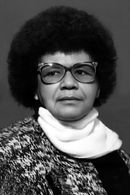Sarah Maldoror is a pioneering filmmaker and artist who has made a significant contribution to the development of pan-African cinema. Born in France, Maldoror grew up in Paris and developed a passion for theater and the arts at a young age. She co-founded the company Les Griots, which became the first black theater company in France, and was a key figure in the company's productions.
Maldoror's early life was marked by her involvement in the African decolonization movements, and she studied at the VGIK, the Moscow film school, before joining the African decolonization movements in Algeria, Guinea, and Guinea-Bissau. She met her companion, Mario Pinto de Andrade, in Paris and co-founded the Movement for the Liberation of Angola with him.
Maldoror's film career began in Algiers, where she worked as an assistant on the film "The Battle of Algiers" and later made her own debut film, "Monangambée", which tells the story of a sympathizer of the struggle for the liberation of Angola who is tortured by the Portuguese colonial army.
Maldoror's most famous film is "Sambizanga", which was shot in the Republic of Congo and tells the story of a woman who sets out to find her husband, a revolutionary activist who has been imprisoned and tortured by the Portuguese army. The film is based on an Angolan novel and was adapted by Maldoror's companion, Pinto de Andrade, with the help of a French writer.
Maldoror continued to make films throughout her career, including documentaries and portraits of artists and writers. She was known for her innovative and rebellious style, which often incorporated elements of fiction, documentary, and poetry.
Maldoror died in April 2020 as a result of Covid-19, but her legacy continues to be celebrated through her films and her contributions to the development of pan-African cinema.













